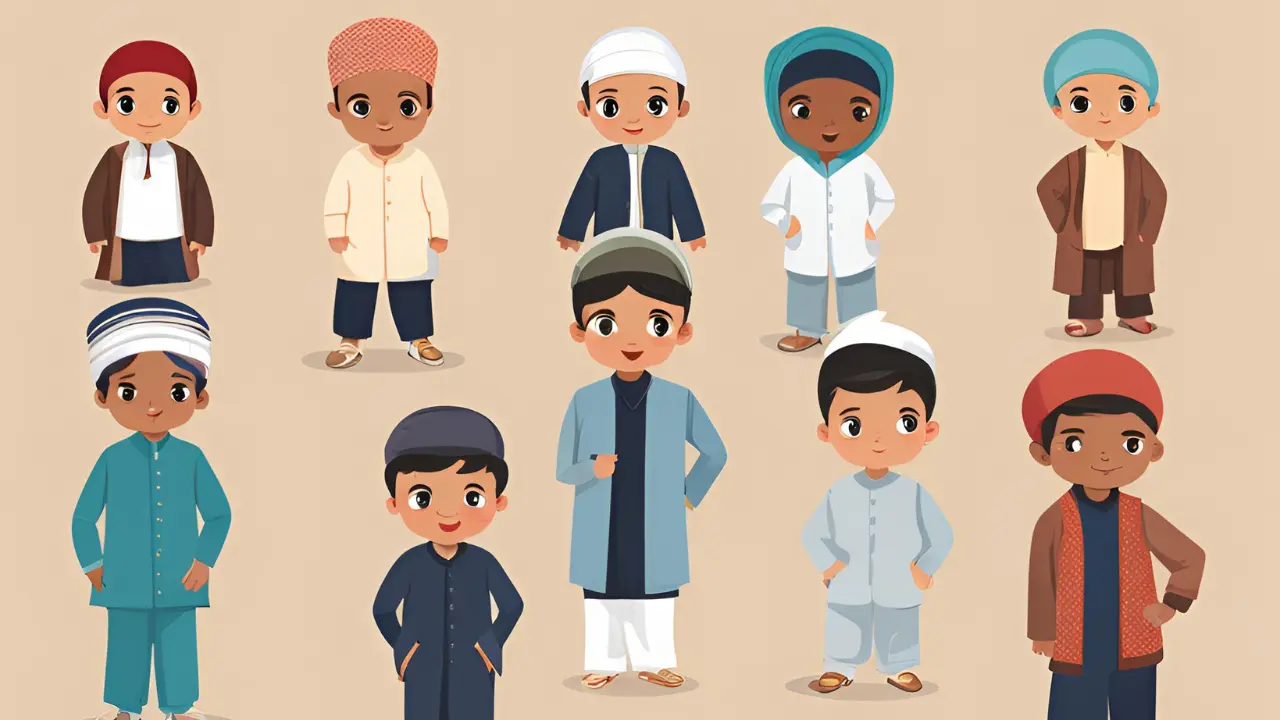Table of Contents
Choosing a name for a child is one of the most significant decisions parents make. In Islam, a name holds deep spiritual and cultural importance, as it reflects the child’s identity, values, and sometimes even their destiny. For Muslim parents, this choice goes beyond aesthetics it is guided by meanings that align with Islamic teachings and principles.
Muslim boy names, often inspired by the Quran, Prophets, or revered figures in Islamic history, carry meanings of honor, virtue, and hope. These names not only resonate with faith but also connect generations through a shared cultural heritage.
In this article, we will explore ten popular Muslim boys’ names, delving into their beautiful meanings and why they remain timeless choices for families worldwide.
The Importance of Names in Islamic Tradition
In Islam, the act of naming a child is considered a sacred responsibility. A name is more than a label it embodies the hopes and prayers parents hold for their child. Islamic teachings emphasize choosing names with positive meanings, as they are believed to influence a person’s character and identity throughout their life.
Religious Guidelines for Naming
Prophet Muhammad (PBUH) encouraged his followers to select names that carry good meanings. He is reported to have said, “The most beloved of your names to Allah are ‘Abdullah’ and ‘Abdur-Rahman’” (Sahih Muslim). Many Muslim names reflect attributes of Allah (e.g., Abdul-Rahman, meaning “Servant of the Most Merciful”) or honor Prophets and righteous individuals.
Names in Islam are also seen as a way to maintain one’s faith. For example, naming a child after a Prophet or a Companion can inspire them to emulate their virtues and moral conduct.
The Influence of Culture and Language
While the meanings of names are rooted in Islamic values, the choice of names often reflects cultural and linguistic diversity. For instance, names like “Omar” and “Hassan” are popular in Arab-speaking communities, while variations like “Yusuf” and “Ismail” are widely used across South Asia, Africa, and even Western countries. Despite these regional differences, the underlying spiritual essence of the names remains intact.
10 Popular Muslim Boys’ Names and Their Meanings
Below are ten widely cherished Muslim boys’ names, each with a profound meaning rooted in Islamic tradition and history.
1. Muhammad (محمد)
- Meaning: Praiseworthy or commendable.
- Significance: Named after Prophet Muhammad (PBUH), this name is one of the most popular in the Muslim world, reflecting love and reverence for the Prophet.
2. Ali (علي)
- Meaning: Noble, exalted, or high-ranking.
- Significance: Associated with Ali ibn Abi Talib, the cousin and son-in-law of the Prophet, known for his wisdom and courage.
3. Yusuf (يوسف)
- Meaning: God will add or increase.
- Significance: The name of Prophet Yusuf (Joseph), renowned for his beauty, patience, and trust in Allah.
4. Omar (عمر)
- Meaning: Long life or flourishing.
- Significance: Reflects the legacy of Umar ibn al-Khattab, the second Caliph of Islam, known for his justice and leadership.
5. Hamza (حمزة)
- Meaning: Lion, strong, or steadfast.
- Significance: Honors Hamza ibn Abdul-Muttalib, the Prophet’s uncle and a valiant warrior in Islamic history.
6. Ibrahim (إبراهيم)
- Meaning: Father of nations.
- Significance: The name of Prophet Ibrahim (Abraham), a pivotal figure in Islam, Christianity, and Judaism.
7. Hassan (حسن)
- Meaning: Handsome, good, or excellent.
- Significance: The name of the Prophet’s grandson, renowned for his kindness and piety.
8. Ahmed (أحمد)
- Meaning: Most praiseworthy.
- Significance: Another name of Prophet Muhammad (PBUH), emphasizing his exemplary qualities.
9. Zaid (زيد)
- Meaning: Growth, increase, or abundance.
- Significance: Inspired by Zaid ibn Harithah, a loyal companion of the Prophet and one of the first to embrace Islam.
10. Ismail (إسماعيل)
- Meaning: God will hear.
- Significance: The name of Prophet Ismail (Ishmael), known for his devotion and pivotal role in the construction of the Kaaba alongside his father, Ibrahim.
These names carry timeless significance, uniting spiritual meaning with historical legacy.
Why These Names Remain Timeless
The enduring popularity of these Muslim boys’ names can be attributed to their deep roots in Islamic history, their association with revered figures, and their universal appeal across cultures.
Association with Prophets and Companions
Many of these names honor Prophets, such as Muhammad, Ibrahim, and Yusuf, whose stories embody qualities like faith, perseverance, and wisdom. Names like Omar and Hamza are tied to the Companions of the Prophet, celebrated for their leadership, bravery, and unwavering commitment to Islam. These associations inspire parents to choose names that carry not just beauty but also profound moral and spiritual significance.
Universality Across Cultures
Despite cultural and linguistic diversity in the Muslim world, these names transcend regional boundaries. For example, Muhammad is equally common in Arabic-speaking countries, South Asia, and even Western nations. Names like Yusuf and Ismail, with their Quranic origins, resonate globally due to their familiarity and simplicity.
Timelessness Through Meaning
The meanings of these names such as “praiseworthy” (Muhammad), “noble” (Ali), and “God will hear” (Ismail) carry values that are as relevant today as they were centuries ago. Parents are drawn to the hope and aspirations these names reflect, ensuring their continued use across generations.
This combination of historical reverence, cultural flexibility, and meaningful attributes ensures these names remain evergreen choices for Muslim families.
Tips for Choosing a Muslim Boy’s Name
Selecting the perfect name for a child is both an exciting and meaningful process. For Muslim parents, it involves balancing tradition, cultural identity, and personal preference while ensuring the name aligns with Islamic teachings. Here are some tips to guide the decision-making process:
Choose Names with Positive Meanings
Islam emphasizes the importance of selecting names with good and honorable meanings. Names that reflect virtues such as kindness, strength, or devotion are highly encouraged. For example, “Hassan” (handsome, good) and “Rahman” (merciful) are positive choices that inspire admirable qualities.
Look to the Quran and Islamic History
Names of Prophets, Companions, and figures mentioned in the Quran are often chosen for their spiritual significance. Names like Yusuf and Ibrahim serve as constant reminders of the exemplary lives these figures led.
Consider Cultural Relevance
While the meaning and religious significance are vital, the name should also be practical within the family’s cultural and linguistic context. For example, a name like “Zaid” is versatile and easy to pronounce in various regions, making it an appealing choice for families living in multicultural societies.
Think About Longevity
Choose a name that will suit the child throughout their life. Avoid overly complex or trendy names that may not stand the test of time. Traditional names like “Omar” or “Ahmed” remain timeless while still being modern.
Keep Pronunciation and Spelling Simple
In a globalized world, names that are easy to spell and pronounce across languages are practical. This consideration is especially important for families living in non-Muslim-majority countries.
Seek Guidance from Family and Religious Leaders
Consulting with elders or Islamic scholars can provide valuable insight into a name’s significance and appropriateness. It also ensures the name aligns with religious guidelines and family traditions.
By keeping these factors in mind, parents can choose a name that reflects their faith, heritage, and aspirations for their child.
Conclusion
A name is much more than a form of identification it is a lifelong gift that shapes a child’s identity and reflects the values cherished by their family. In Islam, names carry profound meaning, often connecting the individual to their faith, heritage, and aspirations for a virtuous life.
The ten popular Muslim boys’ names discussed in this article, such as Muhammad, Ali, and Yusuf, exemplify timelessness and significance. These names honor Prophets and companions, embodying qualities of wisdom, strength, and devotion. By understanding their meanings and historical context, parents can select a name that resonates not only with their religious beliefs but also with their cultural identity.
Ultimately, choosing a name is a deeply personal decision. With thoughtful consideration and adherence to Islamic principles, parents can select a name that becomes a source of pride and inspiration for their child throughout their life.

